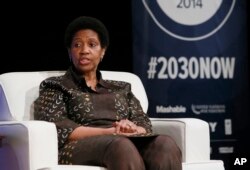Hundreds of women are expected to participate Sunday in a march in New York City promoting gender equality by 2030.
Their ranks are to include the U.N. secretary-general, a Nobel laureate, celebrities, activists and many men who will be expressing their support for women’s rights.
The march, from the United Nations to Times Square, was to kick off two weeks of discussions at the U.N. on women's rights, expected to draw thousands of participants. The events will mark the 20th anniversary of a women’s conference held in China that produced the Beijing Declaration and Platform for Action calling for gender equality and the empowerment of women.
The declaration was adopted by 189 countries in 1995, but activists agree its pledges have only been partly fulfilled.
U.N. Secretary-General Ban Ki-moon, speaking Friday at an International Women’s Day event, said the Beijing Declaration remains an ambitious but realistic agenda for empowering women and girls, but he noted there are still obstacles to overcome.
“The attitudes of societies -- the attitudes of men -- in all regions are still stacked against women,” he said.
Ban said women still do most of the unpaid and low-paid work. He said there are only about 20 women who are heads of states or governments, and he noted that in many countries women are still denied their sexual and reproductive health rights and are the victims of early and forced marriages.
Over the next two weeks, activists will address how to implement laws and change attitudes to improve women’s lives.
The head of U.N. Women, Phumzile Mlambo-Ngcuka, said women need to raise their voices and use the power of their vote. Another critical factor, she said, is working with men -- "to include men that want see change, so we that can increase the muscle of the people that can speak truth to power.”
Many meetings are planned to evaluate and plan to improve the situation of women regarding gender discrimination, as political leaders, in the business sector and as stakeholders in national reconciliation processes.
The conference will also look at violence against women, which affects one in three women worldwide.
The subject has been even more in the spotlight recently, as girls and women have been abducted, raped and sold by terrorist groups including Boko Haram and Islamic State.
The U.N.’s Mlambo-Ngcuka said that women are “in the eye of the storm” more than ever before.
“In fact, it is, indeed, in many parts of world, more dangerous to be a woman than to be a soldier,” she said.
Conference participants hope to mobilize political will and international unity to end abuses of women’s rights and help women prosper in the 21st century.





